prize
-
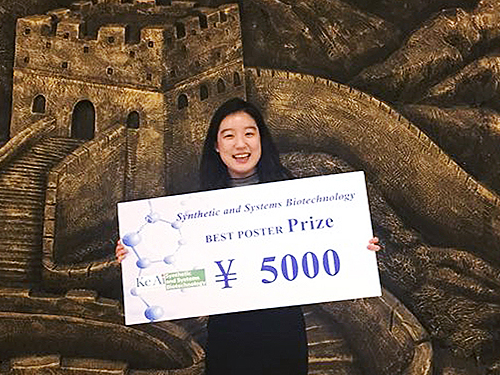 In Jin Cho Earned the Best Poster Prize at ME Summit 2017
In Jin Cho, a Ph.D. student in the Department of Chemical and Biomolecular Engineering at KAIST received the best poster prize at the International Metabolic Engineering Summit 2017 held on October 24 in Beijing, China.
The International Metabolic Engineering Summit is a global conference where scientists and corporate researchers in the field of metabolic engineering present their latest research outcomes and build networks.
At this year’s summit, about 500 researchers from around the world participated in active academic exchanges, including giving keynote speeches and presenting posters.
During the poster session, the summit selects one person for the KeAi-synthetic and Systems Biotechnology Poster Award, two for Microbial Cell Factories Poster Awards, and three for Biotechnology Journal Poster Awards among the posters presented by graduate students, post-doctoral fellows and researchers. Cho received the KeAi-synthetic and Systems Biotechnology Poster Award. Her winning poster is on the biotransformation of p-xylene to terephthalic acid using engineered Escherichia coli.
Terephthalic acid is generally produced by p-xylene oxidation; however, this process requires a high temperature and pressure as well as a toxic catalyst during the reaction process.
Cho and Ziwei Luo, a Ph.D. student at KAIST, co-conducted the research and developed a successful biological conversion process. Compared to the existing chemical process, it does not require a high temperature and pressure; and it is environmentally friendly with a relatively high conversion rate of approximately 97%.
Cho’s advisor, Distinguished Professor Sang Yup Lee said, “Further research on glucose-derived terephthalic acid will enable us to produce biomass-based eco-friendly terephthalic acid through engineered Escherichia coli.”
2017.10.31 View 11570
In Jin Cho Earned the Best Poster Prize at ME Summit 2017
In Jin Cho, a Ph.D. student in the Department of Chemical and Biomolecular Engineering at KAIST received the best poster prize at the International Metabolic Engineering Summit 2017 held on October 24 in Beijing, China.
The International Metabolic Engineering Summit is a global conference where scientists and corporate researchers in the field of metabolic engineering present their latest research outcomes and build networks.
At this year’s summit, about 500 researchers from around the world participated in active academic exchanges, including giving keynote speeches and presenting posters.
During the poster session, the summit selects one person for the KeAi-synthetic and Systems Biotechnology Poster Award, two for Microbial Cell Factories Poster Awards, and three for Biotechnology Journal Poster Awards among the posters presented by graduate students, post-doctoral fellows and researchers. Cho received the KeAi-synthetic and Systems Biotechnology Poster Award. Her winning poster is on the biotransformation of p-xylene to terephthalic acid using engineered Escherichia coli.
Terephthalic acid is generally produced by p-xylene oxidation; however, this process requires a high temperature and pressure as well as a toxic catalyst during the reaction process.
Cho and Ziwei Luo, a Ph.D. student at KAIST, co-conducted the research and developed a successful biological conversion process. Compared to the existing chemical process, it does not require a high temperature and pressure; and it is environmentally friendly with a relatively high conversion rate of approximately 97%.
Cho’s advisor, Distinguished Professor Sang Yup Lee said, “Further research on glucose-derived terephthalic acid will enable us to produce biomass-based eco-friendly terephthalic acid through engineered Escherichia coli.”
2017.10.31 View 11570 -
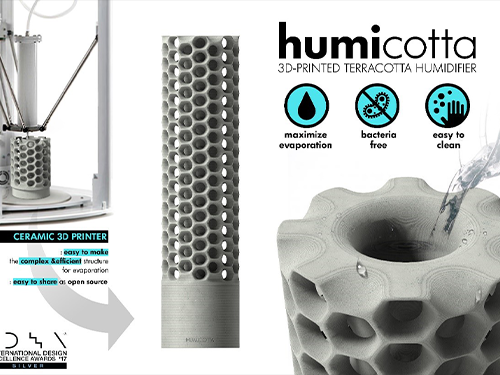 Humicotta Wins the Silver Prize at the 2017 IDEA
The 3D-printed ceramic humidifier made by the research team led by Professor Sang-Min Bae won the silver prize at the 2017 International Design Excellence Awards (IDEA). Professor Bae’s ID+IM team was also listed as winners of three more appropriate technology designs at the IDEA. The awards, sponsored by the Industrial Designers Society of America, are one of the three prestigious design awards including the Red Dot Design Award and the iF Design Award in Germany.
The silver prize winner in the category of home and bath, Humicotta is an energy-efficient, bacteria free, and easy to clean humidifier. It includes a base module and filter. The base is a cylindrical pedestal with a built-in fan on which the filter is placed. The filter is a 3D-printed honeycomb structure made of diatomite. When water is added, the honeycomb structure and porous terracotta maximize natural humidification. It also offers an open platform service that customizes the filters or provides files that users can use their own 3D printer.
Professor Bae’s team has worked on philanthropy design using appropriate technology as their main topic for years. Their designs have been recognized at prestigious global design awards events, winning more than 50 prizes with innovative designs made for addressing various global and social problems.
The Light Funnel is a novel type of lighting device designed for off-grid areas of Africa. It helps to maximize the natural light effect in the daytime without any drastic home renovations. It consists of a transparent acrylic sphere and a reflective pathway. After filling the acrylic sphere with water and placing it on a rooftop, sunlight passes into the house through the water inside the sphere. It provides a lighted environment nine times brighter than without it. Also, once installed, it can be used almost permanently.
The Maasai Smart Cane is made using wood sticks purchased through fair trade with the Maasai tribe. GPS is installed into the grip of the birch-tree cane, so that cane users can send a signal when in an emergency situation. All of the proceeds of this product go to the tribe.
S.Cone is a first aid kit made in collaboration with Samsung Fire and Marine Insurance. The traffic cone-shaped kit is designed to help users handle an emergency situation intact and safe. The S.Cone has unique versions for fires, car accidents, and marine accidents. For example, the S.Cone for fires is equipped with a small fire extinguisher, smoke mask, and fire blanket. The cap of the S.Cone also functions as an IoT station connecting the fire and gas detector with smart phones.
Professor Bae said of his team’s winning design products, “By making the data public, any person can design their own humidifier if they have access to a 3D-printer. We want it to be a very accessible product for the public. The Light Funnel and Maasai Smart Cane are designed for economically-marginalized populations and the elderly. We will continue to make the best designed products serving the marginalized 90% of the population around the world.”
2017.09.14 View 28825
Humicotta Wins the Silver Prize at the 2017 IDEA
The 3D-printed ceramic humidifier made by the research team led by Professor Sang-Min Bae won the silver prize at the 2017 International Design Excellence Awards (IDEA). Professor Bae’s ID+IM team was also listed as winners of three more appropriate technology designs at the IDEA. The awards, sponsored by the Industrial Designers Society of America, are one of the three prestigious design awards including the Red Dot Design Award and the iF Design Award in Germany.
The silver prize winner in the category of home and bath, Humicotta is an energy-efficient, bacteria free, and easy to clean humidifier. It includes a base module and filter. The base is a cylindrical pedestal with a built-in fan on which the filter is placed. The filter is a 3D-printed honeycomb structure made of diatomite. When water is added, the honeycomb structure and porous terracotta maximize natural humidification. It also offers an open platform service that customizes the filters or provides files that users can use their own 3D printer.
Professor Bae’s team has worked on philanthropy design using appropriate technology as their main topic for years. Their designs have been recognized at prestigious global design awards events, winning more than 50 prizes with innovative designs made for addressing various global and social problems.
The Light Funnel is a novel type of lighting device designed for off-grid areas of Africa. It helps to maximize the natural light effect in the daytime without any drastic home renovations. It consists of a transparent acrylic sphere and a reflective pathway. After filling the acrylic sphere with water and placing it on a rooftop, sunlight passes into the house through the water inside the sphere. It provides a lighted environment nine times brighter than without it. Also, once installed, it can be used almost permanently.
The Maasai Smart Cane is made using wood sticks purchased through fair trade with the Maasai tribe. GPS is installed into the grip of the birch-tree cane, so that cane users can send a signal when in an emergency situation. All of the proceeds of this product go to the tribe.
S.Cone is a first aid kit made in collaboration with Samsung Fire and Marine Insurance. The traffic cone-shaped kit is designed to help users handle an emergency situation intact and safe. The S.Cone has unique versions for fires, car accidents, and marine accidents. For example, the S.Cone for fires is equipped with a small fire extinguisher, smoke mask, and fire blanket. The cap of the S.Cone also functions as an IoT station connecting the fire and gas detector with smart phones.
Professor Bae said of his team’s winning design products, “By making the data public, any person can design their own humidifier if they have access to a 3D-printer. We want it to be a very accessible product for the public. The Light Funnel and Maasai Smart Cane are designed for economically-marginalized populations and the elderly. We will continue to make the best designed products serving the marginalized 90% of the population around the world.”
2017.09.14 View 28825 -
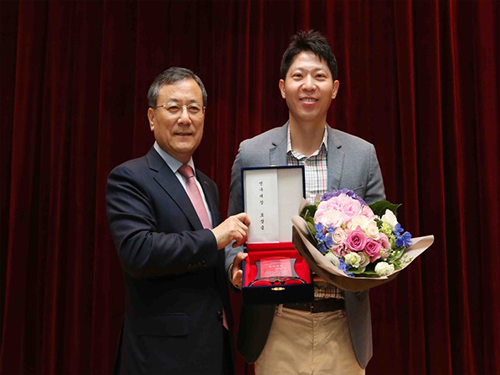 2017 KAIST Research Day Honors Professor Hoon Sohn
The 2017 KAIST Research Day recognized Professor Hoon Sohn of the Department of Civil and Environmental Engineering as Research Grand Prize Awardee in addition to the 10 most distinguished research achievements of the past year.
The Research Grand Prize recognizes the professor whose comprehensive research performance evaluation indicator is the highest over the past five years. The indicator combines the factors of the number of research contracts, IPR, royalty income, as well as research overhead cost inclusion.
During the ceremony, which was held on May 23, Professor Jun-Ho Oh of the Department of Mechanical Engineering and Professor Sang Yup Lee of the Department of Chemical and Biomolecular Engineering also won the Best Research Award. The two professors had the best scores when evaluating their research performance for one-year periods.
Meanwhile, the Research Innovation Award went to Professor YongKeun Park of the Department of Physics. The Research Innovation Award scores the factors of foreign patent registration, contracts of technological transfer and income from technology fees, technology consultations, and startups and selected Professor Park as the top winner.
Professors Yong Hee Lee of the Department of Physics and Jonghwa Shin of the Department of Material Science won the Convergence Research Award. The Convergence Research Award recognizes the most outstanding research team who created innovative research results for a year.
After the ceremony, President Chen Shiyi of the Southern University of Science and Technology gave a distinguished lecture on the “Global & Entrepreneurial Universities for the Age of the Fourth Industrial Revolution.” the Research Day ceremony, KAIST also presented the ten most distinguished research achievements made by KAIST professors during the last year as follows (Click):
▲ Commercialization of 3D Holographic Microscopy by Professor YongKeun Park of the Department of Physics
▲ Designer Proteins with Chemical Modifications by Professor Hee-Sung Park of the Department of Chemistry
▲ Lanthanum-Catalyzed Synthesis of Microporous 3D Graphene-Like Carbons in a Zeolite Template by Professor Ryong Ryoo of the Department of Chemistry
▲ Complete Prevention of Blood Loss by Self-Sealing Hemostatic Needles by Professor Haeshin Lee of the Department of Chemistry
▲ An Immunological Mechanism for the Contribution of Commensal Microbiota Against Herpes Simplex Virus Infection in Genital Mucosa by Heung Kyu Lee of the Graduate School of Medical Science and Engineering
▲ Development of a Pulse-Echo Laser Ultrasonic Propagation Imaging System by Professor Jung-Ryul Lee of the Department of Aerospace Engineering
▲ Bi-refractive Stereo Imaging for Single-Shot Depth Acquisition by Professor Min H. Kim of the School of Computing
▲ Development of Environment Friendly Geotechnical Construction Material Using Biopolymer by Professor Gye-Chun Cho of the Department of Civil and Environmental Engineering
▲ Protein Delivery Via Engineered Exosomes by Professor Chulhee Choi of the Department of Bio and Brain Engineering
▲ Hot Electron Detection Under Catalytic Reactions by Professor Jeong Young Park of the Graduate School of EEWS.
After the ceremony, President Chen Shiyi of the Southern University of Science and Technology gave a distinguished lecture on the “Global & Entrepreneurial Universities for the Age of the Fourth Industrial Revolution.”
(Photo:President Shin poses with the 2017 KAIST Research Grand Prize Winner Professor Hoon Sohn on May 23.)
2017.05.23 View 15681
2017 KAIST Research Day Honors Professor Hoon Sohn
The 2017 KAIST Research Day recognized Professor Hoon Sohn of the Department of Civil and Environmental Engineering as Research Grand Prize Awardee in addition to the 10 most distinguished research achievements of the past year.
The Research Grand Prize recognizes the professor whose comprehensive research performance evaluation indicator is the highest over the past five years. The indicator combines the factors of the number of research contracts, IPR, royalty income, as well as research overhead cost inclusion.
During the ceremony, which was held on May 23, Professor Jun-Ho Oh of the Department of Mechanical Engineering and Professor Sang Yup Lee of the Department of Chemical and Biomolecular Engineering also won the Best Research Award. The two professors had the best scores when evaluating their research performance for one-year periods.
Meanwhile, the Research Innovation Award went to Professor YongKeun Park of the Department of Physics. The Research Innovation Award scores the factors of foreign patent registration, contracts of technological transfer and income from technology fees, technology consultations, and startups and selected Professor Park as the top winner.
Professors Yong Hee Lee of the Department of Physics and Jonghwa Shin of the Department of Material Science won the Convergence Research Award. The Convergence Research Award recognizes the most outstanding research team who created innovative research results for a year.
After the ceremony, President Chen Shiyi of the Southern University of Science and Technology gave a distinguished lecture on the “Global & Entrepreneurial Universities for the Age of the Fourth Industrial Revolution.” the Research Day ceremony, KAIST also presented the ten most distinguished research achievements made by KAIST professors during the last year as follows (Click):
▲ Commercialization of 3D Holographic Microscopy by Professor YongKeun Park of the Department of Physics
▲ Designer Proteins with Chemical Modifications by Professor Hee-Sung Park of the Department of Chemistry
▲ Lanthanum-Catalyzed Synthesis of Microporous 3D Graphene-Like Carbons in a Zeolite Template by Professor Ryong Ryoo of the Department of Chemistry
▲ Complete Prevention of Blood Loss by Self-Sealing Hemostatic Needles by Professor Haeshin Lee of the Department of Chemistry
▲ An Immunological Mechanism for the Contribution of Commensal Microbiota Against Herpes Simplex Virus Infection in Genital Mucosa by Heung Kyu Lee of the Graduate School of Medical Science and Engineering
▲ Development of a Pulse-Echo Laser Ultrasonic Propagation Imaging System by Professor Jung-Ryul Lee of the Department of Aerospace Engineering
▲ Bi-refractive Stereo Imaging for Single-Shot Depth Acquisition by Professor Min H. Kim of the School of Computing
▲ Development of Environment Friendly Geotechnical Construction Material Using Biopolymer by Professor Gye-Chun Cho of the Department of Civil and Environmental Engineering
▲ Protein Delivery Via Engineered Exosomes by Professor Chulhee Choi of the Department of Bio and Brain Engineering
▲ Hot Electron Detection Under Catalytic Reactions by Professor Jeong Young Park of the Graduate School of EEWS.
After the ceremony, President Chen Shiyi of the Southern University of Science and Technology gave a distinguished lecture on the “Global & Entrepreneurial Universities for the Age of the Fourth Industrial Revolution.”
(Photo:President Shin poses with the 2017 KAIST Research Grand Prize Winner Professor Hoon Sohn on May 23.)
2017.05.23 View 15681 -
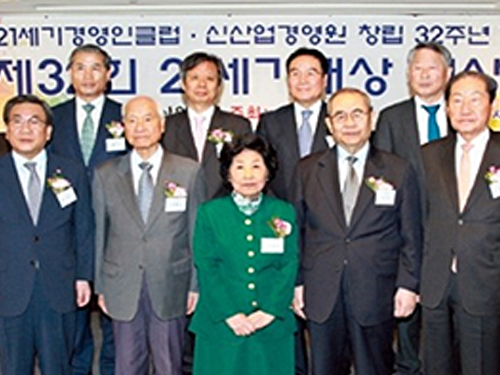 Professor Duck-Joo Lee Awarded the 21st Century Grand Prize
Professor Duck-Joo Lee of the Department of Aerospace Engineering was awarded the 21st Century Grand Prize in the field of technology development by the New Industry Management Academy and the 21st Leaders Club on April 13.
Professor Lee was honored in recognition of his contribution to the helicopter industry. He played a part in domestic helicopter development projects including the KUH-1 Surion (Korean Attack Helicopter), a twin-engine, transport utility helicopter as well as LAH (Light Armed Helicopter) and LCH (Light Civil Helicopter) projects.
Since joining KAIST in 1988, Professor Lee supervised more than 26 PhDs and 27 MSs. He was responsible for hosting the 1st Asian-Australian Rotorcraft Forum and Exhibition and currently serves as vice president of the American Helicopter Society and the Korea Drone Industry Promotion Association. He also participated in open online courses on K-MOOC and Coursera.
(Caption: Professor Lee (second from left in the first row) poses after receiving the award.)
2017.04.26 View 9072
Professor Duck-Joo Lee Awarded the 21st Century Grand Prize
Professor Duck-Joo Lee of the Department of Aerospace Engineering was awarded the 21st Century Grand Prize in the field of technology development by the New Industry Management Academy and the 21st Leaders Club on April 13.
Professor Lee was honored in recognition of his contribution to the helicopter industry. He played a part in domestic helicopter development projects including the KUH-1 Surion (Korean Attack Helicopter), a twin-engine, transport utility helicopter as well as LAH (Light Armed Helicopter) and LCH (Light Civil Helicopter) projects.
Since joining KAIST in 1988, Professor Lee supervised more than 26 PhDs and 27 MSs. He was responsible for hosting the 1st Asian-Australian Rotorcraft Forum and Exhibition and currently serves as vice president of the American Helicopter Society and the Korea Drone Industry Promotion Association. He also participated in open online courses on K-MOOC and Coursera.
(Caption: Professor Lee (second from left in the first row) poses after receiving the award.)
2017.04.26 View 9072 -
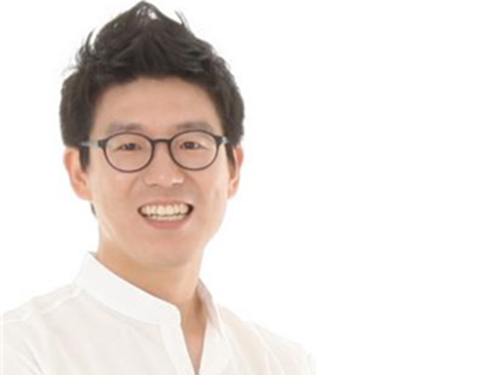 Professor Jae Kyoung Kim Receives the 2017 HSFP Award
The Human Frontier Science Program (HSFP), one of the most competitive research grants in life sciences, has funded researchers worldwide across and beyond the field since 1990. Each year, the program selects a handful of recipients who push the envelope of basic research in biology to bring breakthroughs from novel approaches. Among its 7,000 recipients thus far, 26 scientists have received the Nobel Prize. For that reason, HSFP grants are often referred to as “Nobel Prize Grants.”
Professor Jae Kyoung Kim of the Mathematical Sciences Department at KAIST and his international collaborators, Professor Robert Havekes from the University of Groningen, the Netherlands, Professor Sara Aton from the University of Michigan in Ann Arbor, the United States, and Professor Matias Zurbriggen from the University of Düsseldorf, Germany, won the Young Investigator Grants of the 2017 HSFP.
The 30 winning teams of the 2017 competition (in 9 Young Investigator Grants and 21 Program Grants) went through a rigorous year-long review process from a total of 1,073 applications submitted from more than 60 countries around the world. Each winning team will receive financial support averaging 110,000-125,000 USD per year for three years.
Although Professor Kim was trained as a mathematician, he has extended his research focus into biological sciences and attempted to solve some of the most difficult problems in biology by employing mathematical theories and applications including nonlinear dynamics, stochastic process, singular perturbation, and parameter estimation.
The project that won the Young Investigator Grants was a study on how a molecular circadian clock may affect sleep-regulated neurophysiology in mammals. Physiological and metabolic processes such as sleep, blood pressure, and hormone secretion exhibit circadian rhythms in mammals. Professor Kim used mathematical modeling and analysis to explain that the mammalian circadian clock is a hierarchical system, in which the master clock in the superchiasmatic nucleus, a tiny region in the brain that controls circadian rhythms, functions as a pacemaker and synchronizer of peripheral clocks to generate coherent systematic rhythms throughout the body.
Professor Kim said, “The mechanisms of our neuronal and hormonal activities regulating many of our bodily functions over a 24-hour cycle are not yet fully known. We go to sleep every night, but do not really know how it affects our brain functions. I hope my experience in mathematics, along with insights from biologists, can find meaningful answers to some of today’s puzzling problems in biological sciences, for example, revealing the complexities of our brains and showing how they work.”
“In the meantime, I hope collaborations between the fields of mathematics and biology, as yet a rare phenomenon in the Korean scientific community, will become more popular in the near future.”
Professor Kim received his doctoral degree in Applied and Interdisciplinary Mathematics in 2013 from the University of Michigan and joined KAIST in 2015. He has published numerous articles in reputable science journals such as Science, Molecular Cell, Proceedings of the National Academy of Sciences, and Nature Communications.
Both the Program Grants and Young Investigator Grants support international teams with members from at least two countries for innovative and creative research. This year, the Program Grants were awarded to research topics ranging from the evolution of counting and the role of extracellular vesicles in breast cancer bone metastasis to the examination of obesity from a mechanobiological point of view.
The Young Investigator Grants are limited to teams that established their independent research within the last five years and received their doctoral degrees within the last decade. Besides Professor Kim’s study, such topics as the use of infrasound for navigation by seabirds and protein formation in photochemistry and photophysics were awarded in 2017.
Full lists of the 2017 HFSP winners are available at: http://www.hfsp.org/awardees/newly-awarded.
About the Human Frontier Science Program (HFSP):
The HFSP is a research funding program implemented by the International Human Frontier Science Program (HFSPO) based in Strasbourg, France. It promotes intercontinental collaboration and training in cutting-edge, interdisciplinary research specializing in life sciences. Founded in 1989, the HFSPO consists of the European Union and 14 other countries including the G7 nations and South Korea.
2017.03.21 View 12059
Professor Jae Kyoung Kim Receives the 2017 HSFP Award
The Human Frontier Science Program (HSFP), one of the most competitive research grants in life sciences, has funded researchers worldwide across and beyond the field since 1990. Each year, the program selects a handful of recipients who push the envelope of basic research in biology to bring breakthroughs from novel approaches. Among its 7,000 recipients thus far, 26 scientists have received the Nobel Prize. For that reason, HSFP grants are often referred to as “Nobel Prize Grants.”
Professor Jae Kyoung Kim of the Mathematical Sciences Department at KAIST and his international collaborators, Professor Robert Havekes from the University of Groningen, the Netherlands, Professor Sara Aton from the University of Michigan in Ann Arbor, the United States, and Professor Matias Zurbriggen from the University of Düsseldorf, Germany, won the Young Investigator Grants of the 2017 HSFP.
The 30 winning teams of the 2017 competition (in 9 Young Investigator Grants and 21 Program Grants) went through a rigorous year-long review process from a total of 1,073 applications submitted from more than 60 countries around the world. Each winning team will receive financial support averaging 110,000-125,000 USD per year for three years.
Although Professor Kim was trained as a mathematician, he has extended his research focus into biological sciences and attempted to solve some of the most difficult problems in biology by employing mathematical theories and applications including nonlinear dynamics, stochastic process, singular perturbation, and parameter estimation.
The project that won the Young Investigator Grants was a study on how a molecular circadian clock may affect sleep-regulated neurophysiology in mammals. Physiological and metabolic processes such as sleep, blood pressure, and hormone secretion exhibit circadian rhythms in mammals. Professor Kim used mathematical modeling and analysis to explain that the mammalian circadian clock is a hierarchical system, in which the master clock in the superchiasmatic nucleus, a tiny region in the brain that controls circadian rhythms, functions as a pacemaker and synchronizer of peripheral clocks to generate coherent systematic rhythms throughout the body.
Professor Kim said, “The mechanisms of our neuronal and hormonal activities regulating many of our bodily functions over a 24-hour cycle are not yet fully known. We go to sleep every night, but do not really know how it affects our brain functions. I hope my experience in mathematics, along with insights from biologists, can find meaningful answers to some of today’s puzzling problems in biological sciences, for example, revealing the complexities of our brains and showing how they work.”
“In the meantime, I hope collaborations between the fields of mathematics and biology, as yet a rare phenomenon in the Korean scientific community, will become more popular in the near future.”
Professor Kim received his doctoral degree in Applied and Interdisciplinary Mathematics in 2013 from the University of Michigan and joined KAIST in 2015. He has published numerous articles in reputable science journals such as Science, Molecular Cell, Proceedings of the National Academy of Sciences, and Nature Communications.
Both the Program Grants and Young Investigator Grants support international teams with members from at least two countries for innovative and creative research. This year, the Program Grants were awarded to research topics ranging from the evolution of counting and the role of extracellular vesicles in breast cancer bone metastasis to the examination of obesity from a mechanobiological point of view.
The Young Investigator Grants are limited to teams that established their independent research within the last five years and received their doctoral degrees within the last decade. Besides Professor Kim’s study, such topics as the use of infrasound for navigation by seabirds and protein formation in photochemistry and photophysics were awarded in 2017.
Full lists of the 2017 HFSP winners are available at: http://www.hfsp.org/awardees/newly-awarded.
About the Human Frontier Science Program (HFSP):
The HFSP is a research funding program implemented by the International Human Frontier Science Program (HFSPO) based in Strasbourg, France. It promotes intercontinental collaboration and training in cutting-edge, interdisciplinary research specializing in life sciences. Founded in 1989, the HFSPO consists of the European Union and 14 other countries including the G7 nations and South Korea.
2017.03.21 View 12059 -
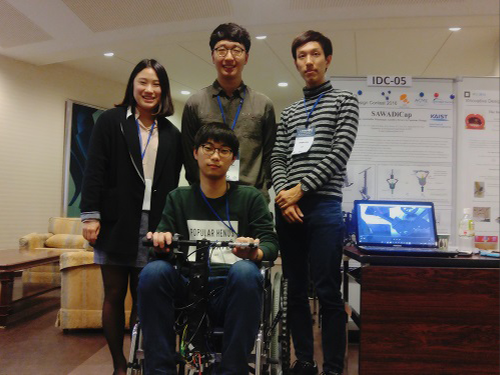 KAIST Undergraduates Win the Innovative Design Contest 2016
A team of KAIST students, consisting of five undergraduates (Do-Hoon Kwon, Tae-Hyun Kim, Hak-Gi Do, Hyun-Joo Lee, and Jong-Ho Jeong) from the Department of Mechanical Engineering, won the grand prize at the Innovative Design Contest held at Osaka University in Japan on December 12-13, 2016. The event took place during the 16th Asia Design Engineering Workshop (A-DEWS).
For this year’s contest, a total of ten student teams from such countries as Korea, Japan, Taiwan, and Malaysia participated, and Team KAIST earned the highest scores. The five KAIST students, all taking the course entitled “Production of Creative Systems,” developed a manual wheelchair accessory called “Safe Attachable Wheelchair Assistive Device in Capstone Design (SAWADiCap).
SAWADiCap is a detachable auxiliary power device that increases the range and mobility of manual wheelchairs. The device can easily be installed and removed, compared to existing add-on attachments for wheelchairs. Users can also enjoy similar advantages offered by powered wheelchairs at a lower cost. In their presentation on the device, the KAIST students introduced their design to improve the power of manual wheelchairs employing the magnetic reinforcement effect and to include the safety features necessary for users to install or operate the device.
Do-Hoon Kwon said, “Our team had a great experience participating in the contest—we met people with diverse backgrounds and expanded our understanding in the field.”
Professor Seibum B. Choi of the Mechanical Engineering Department, who advises the KAIST team, added, “I hope our technology can help the spread of affordable wheelchairs and increase mobility for the disabled.”
Established in 2000, A-DEWS is held annually by the Asian branch of the Design Engineering Workshop to provide an international forum for researchers and practitioners in the field of design engineering by facilitating the exchange of recent research results and sharing knowledge about design strategies and methods. This year’s theme for the workshop was “Innovation of Life.”
A-DEWS hosts the Innovative Design Contest to encourage young engineers, researchers, and students who are creating innovative products, services, and product-services and to show appreciation for their efforts.
Pictured below from left to right are Hyun-Joo Lee, Do-Hoon Kwon, Jong-Ho Jeong, and Hak-Gi Do.
2017.01.03 View 10795
KAIST Undergraduates Win the Innovative Design Contest 2016
A team of KAIST students, consisting of five undergraduates (Do-Hoon Kwon, Tae-Hyun Kim, Hak-Gi Do, Hyun-Joo Lee, and Jong-Ho Jeong) from the Department of Mechanical Engineering, won the grand prize at the Innovative Design Contest held at Osaka University in Japan on December 12-13, 2016. The event took place during the 16th Asia Design Engineering Workshop (A-DEWS).
For this year’s contest, a total of ten student teams from such countries as Korea, Japan, Taiwan, and Malaysia participated, and Team KAIST earned the highest scores. The five KAIST students, all taking the course entitled “Production of Creative Systems,” developed a manual wheelchair accessory called “Safe Attachable Wheelchair Assistive Device in Capstone Design (SAWADiCap).
SAWADiCap is a detachable auxiliary power device that increases the range and mobility of manual wheelchairs. The device can easily be installed and removed, compared to existing add-on attachments for wheelchairs. Users can also enjoy similar advantages offered by powered wheelchairs at a lower cost. In their presentation on the device, the KAIST students introduced their design to improve the power of manual wheelchairs employing the magnetic reinforcement effect and to include the safety features necessary for users to install or operate the device.
Do-Hoon Kwon said, “Our team had a great experience participating in the contest—we met people with diverse backgrounds and expanded our understanding in the field.”
Professor Seibum B. Choi of the Mechanical Engineering Department, who advises the KAIST team, added, “I hope our technology can help the spread of affordable wheelchairs and increase mobility for the disabled.”
Established in 2000, A-DEWS is held annually by the Asian branch of the Design Engineering Workshop to provide an international forum for researchers and practitioners in the field of design engineering by facilitating the exchange of recent research results and sharing knowledge about design strategies and methods. This year’s theme for the workshop was “Innovation of Life.”
A-DEWS hosts the Innovative Design Contest to encourage young engineers, researchers, and students who are creating innovative products, services, and product-services and to show appreciation for their efforts.
Pictured below from left to right are Hyun-Joo Lee, Do-Hoon Kwon, Jong-Ho Jeong, and Hak-Gi Do.
2017.01.03 View 10795 -
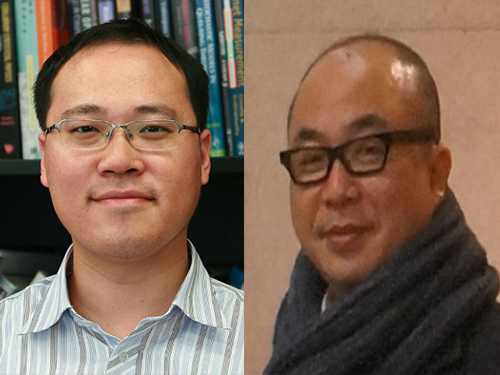 KAIST Researchers Receive the 2016 IEEE William R. Bennett Prize
A research team led by Professors Yung Yi and Song Chong from the Electrical Engineering Department at KAIST has been awarded the 2016 William R. Bennett Prize of the Institute of Electrical and Electronics Engineers (IEEE), which is the most prestigious award in the field of communications network. The IEEE bestows the honor annually and selects winning papers from among those published in the past three years for its quality, originality, scientific citation index, and peer reviews.
The IEEE award ceremony will take place on May 24, 2016 at the IEEE International Conference on Communications in Kuala Lumpur, Malaysia.
The team members include Dr. Kyoung-Han Lee, a KAIST graduate, who is currently a professor at Ulsan National Institute of Science and Technology (UNIST) in Korea, Dr. Joo-Hyun Lee, a postdoctoral researcher at Ohio State University in the United States, and In-Jong Rhee, a vice president of the Mobile Division at Samsung Electronics. The same KAIST team previously received the award back in 2013, making them the second recipient ever to win the IEEE William R. Bennett Prize twice.
Past winners include Professors Robert Gallager of the Massachusetts Institute of Technology (MIT), Sachin Katti of Stanford University, and Ion Stoica of the University of California at Berkeley.
The research team received the Bennett award for their work on “Mobile Data Offloading: How Much Can WiFi Deliver?” Their research paper has been cited more than 500 times since its publication in 2013. They proposed an original method to effectively offload the cellular network and maximize the Wi-Fi network usage by analyzing the pattern of individual human mobility in daily life.
2016.05.02 View 15080
KAIST Researchers Receive the 2016 IEEE William R. Bennett Prize
A research team led by Professors Yung Yi and Song Chong from the Electrical Engineering Department at KAIST has been awarded the 2016 William R. Bennett Prize of the Institute of Electrical and Electronics Engineers (IEEE), which is the most prestigious award in the field of communications network. The IEEE bestows the honor annually and selects winning papers from among those published in the past three years for its quality, originality, scientific citation index, and peer reviews.
The IEEE award ceremony will take place on May 24, 2016 at the IEEE International Conference on Communications in Kuala Lumpur, Malaysia.
The team members include Dr. Kyoung-Han Lee, a KAIST graduate, who is currently a professor at Ulsan National Institute of Science and Technology (UNIST) in Korea, Dr. Joo-Hyun Lee, a postdoctoral researcher at Ohio State University in the United States, and In-Jong Rhee, a vice president of the Mobile Division at Samsung Electronics. The same KAIST team previously received the award back in 2013, making them the second recipient ever to win the IEEE William R. Bennett Prize twice.
Past winners include Professors Robert Gallager of the Massachusetts Institute of Technology (MIT), Sachin Katti of Stanford University, and Ion Stoica of the University of California at Berkeley.
The research team received the Bennett award for their work on “Mobile Data Offloading: How Much Can WiFi Deliver?” Their research paper has been cited more than 500 times since its publication in 2013. They proposed an original method to effectively offload the cellular network and maximize the Wi-Fi network usage by analyzing the pattern of individual human mobility in daily life.
2016.05.02 View 15080 -
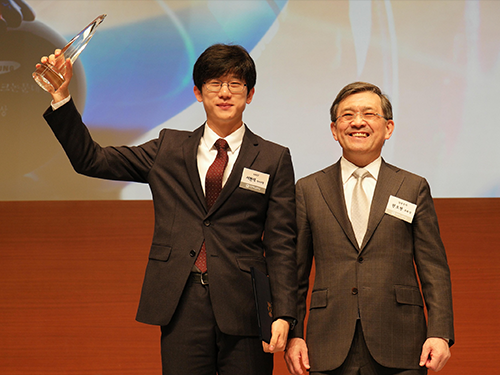 Ph.D. Candidate Seo Wins the Human Tech Paper Award
Hyun-Suk Seo, a doctoral student of KAIST’s Department of Electrical Engineering, received the grand prize of the “22nd Human Tech Paper Award” on February 3, 2016 from Samsung Electronics Co., Ltd.
Seo was the first to receive this prize ever since the Human Tech Paper Award was established 22 years ago. Until last year, the highest prize awarded for KAIST was a gold one.
The “Human Tech Paper Award” was established in 1994 by Samsung Electronics to discover and support outstanding scientists in the field of electrical engineering.
Entitled “Self-Gated Cardiac Cine MRI Using Phase Information,” Seo’s paper presented a technology that would reduce discomforts and inconveniences experienced by patients who take a magnetic resonance imaging (MRI).
This technology uses the speed changes of aorta and the abdominal movements of body to obtain the phase changes of magnetic resonance signals so that MRIs may be taken despite the organs’ movements.
Seo commented on his research, “I wanted to develop a technique that can make MRI a more comfortable experience. I will continue my research on this subject and hope to serve the needs of the society.”
In addition, the “Special Award,” which is given to schools, was awarded to KAIST. KAIST’s Department of Electrical Engineering has also been named the department that has received the second most awards (15 awards) this year.
Oh-Hyun Kwon, Vice President of Samsung Electronics, Steve Kang, President of KAIST, and Nak-In Seo, President of Seoul National University, participated in the event.
Picture: Hyun-Suk Seo (left), the recipient of the grand prize of the 2016 Human Tech Paper Award, and Oh-Hyun Kwon (right), Vice President of Samsung Electronics
2016.02.06 View 10838
Ph.D. Candidate Seo Wins the Human Tech Paper Award
Hyun-Suk Seo, a doctoral student of KAIST’s Department of Electrical Engineering, received the grand prize of the “22nd Human Tech Paper Award” on February 3, 2016 from Samsung Electronics Co., Ltd.
Seo was the first to receive this prize ever since the Human Tech Paper Award was established 22 years ago. Until last year, the highest prize awarded for KAIST was a gold one.
The “Human Tech Paper Award” was established in 1994 by Samsung Electronics to discover and support outstanding scientists in the field of electrical engineering.
Entitled “Self-Gated Cardiac Cine MRI Using Phase Information,” Seo’s paper presented a technology that would reduce discomforts and inconveniences experienced by patients who take a magnetic resonance imaging (MRI).
This technology uses the speed changes of aorta and the abdominal movements of body to obtain the phase changes of magnetic resonance signals so that MRIs may be taken despite the organs’ movements.
Seo commented on his research, “I wanted to develop a technique that can make MRI a more comfortable experience. I will continue my research on this subject and hope to serve the needs of the society.”
In addition, the “Special Award,” which is given to schools, was awarded to KAIST. KAIST’s Department of Electrical Engineering has also been named the department that has received the second most awards (15 awards) this year.
Oh-Hyun Kwon, Vice President of Samsung Electronics, Steve Kang, President of KAIST, and Nak-In Seo, President of Seoul National University, participated in the event.
Picture: Hyun-Suk Seo (left), the recipient of the grand prize of the 2016 Human Tech Paper Award, and Oh-Hyun Kwon (right), Vice President of Samsung Electronics
2016.02.06 View 10838 -
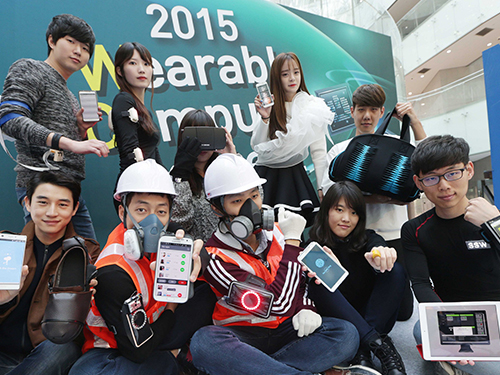 KAIST Hosts the Wearable Computer Contest 2015
“What you see is a compact electronic system on a dust mask, which monitors the amount of dust taken in by a worker and lets other workers know if the person is injured in an industrial site,” said Bum Taek Jung, a Master’s candidate from Sungkyunkwan University during the Wearable Computer Contest 2015 held in KI building of KAIST on November 5, 2015.
He explained his interest in developing this system, “Dust-related respiratory diseases and falling accidents are still prevalent in industrial sites.” He added, “Using the smart dust mask helps monitoring workers’ physical condition in real time, allowing us to cope with accidents in a much more timely manner.” A smart dust mask is a portable device that alerts the user with orange or red light signs when the amount of dust inhaled by the user is higher than the threshold. Its application on a smartphone can also allow project managers to alert the risk of falling accidents to workers by employing a gyroscope and an accelerometer on the mask.
The Wearable Computer Contest 2015 met for the eleventh time at KAIST on November 5-6, 2015. A wearable computer refers to a portable device which users can wear directly on the body or on their clothes while moving. Products that can provide various services by connecting to a smartphone have become increasingly popular. The contest is an excellent opportunity for university students to design creative wearable systems similar to those often depicted in movies and comics.
This year 102 teams from universities all over the nation participated. After screening and evaluation of their presentations, only 8 teams in the product section and 3 teams in the ideas section were selected for the finals. Of the many entries to the contest, the ECG security system caught many people’s attention. The wearable, which attaches to a shirt, acts like an electrocardiogram. By comparing the ECG reading with the one stored in the data server, the wearable can authenticate the user. The system could be widely used by enterprises and financial companies where tight security and authentication are crucial.
The winners of the product and the ideas sections received USD 4,300 and usd 860 respectively along with Minister Prizes from the Minister of Science, ICT and Future Planning of Korea. The Chairman of the contest, Professor Hoi-Jun Yoo from the Electrical Engineering Department of KAIST said, “The contest will be a great opportunity for anyone to have a look at advanced wearable devices developed through close integration of state-of-the-art technologies and creative ideas from young minds.”
2015.11.05 View 9566
KAIST Hosts the Wearable Computer Contest 2015
“What you see is a compact electronic system on a dust mask, which monitors the amount of dust taken in by a worker and lets other workers know if the person is injured in an industrial site,” said Bum Taek Jung, a Master’s candidate from Sungkyunkwan University during the Wearable Computer Contest 2015 held in KI building of KAIST on November 5, 2015.
He explained his interest in developing this system, “Dust-related respiratory diseases and falling accidents are still prevalent in industrial sites.” He added, “Using the smart dust mask helps monitoring workers’ physical condition in real time, allowing us to cope with accidents in a much more timely manner.” A smart dust mask is a portable device that alerts the user with orange or red light signs when the amount of dust inhaled by the user is higher than the threshold. Its application on a smartphone can also allow project managers to alert the risk of falling accidents to workers by employing a gyroscope and an accelerometer on the mask.
The Wearable Computer Contest 2015 met for the eleventh time at KAIST on November 5-6, 2015. A wearable computer refers to a portable device which users can wear directly on the body or on their clothes while moving. Products that can provide various services by connecting to a smartphone have become increasingly popular. The contest is an excellent opportunity for university students to design creative wearable systems similar to those often depicted in movies and comics.
This year 102 teams from universities all over the nation participated. After screening and evaluation of their presentations, only 8 teams in the product section and 3 teams in the ideas section were selected for the finals. Of the many entries to the contest, the ECG security system caught many people’s attention. The wearable, which attaches to a shirt, acts like an electrocardiogram. By comparing the ECG reading with the one stored in the data server, the wearable can authenticate the user. The system could be widely used by enterprises and financial companies where tight security and authentication are crucial.
The winners of the product and the ideas sections received USD 4,300 and usd 860 respectively along with Minister Prizes from the Minister of Science, ICT and Future Planning of Korea. The Chairman of the contest, Professor Hoi-Jun Yoo from the Electrical Engineering Department of KAIST said, “The contest will be a great opportunity for anyone to have a look at advanced wearable devices developed through close integration of state-of-the-art technologies and creative ideas from young minds.”
2015.11.05 View 9566 -
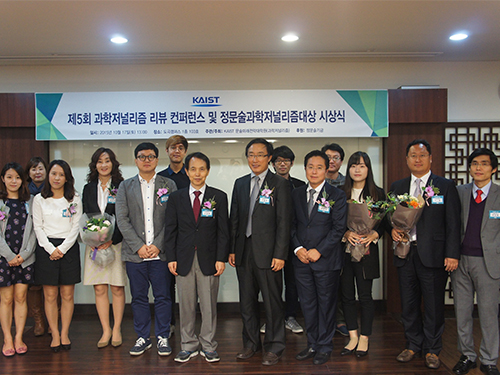 KAIST's Moon Soul Graduate School of Future Strategy Names Recipients of Science Journalism Awards
The Science Journalism Masters Program of the Moon Soul Graduate School of Future Strategy at KAIST named the winners of the 2015 Science Journalism Awards on October 17, 2015. The award ceremony took place at KAIST’s Seoul campus.
The awards were created in 2011 to recognize exemplary journalism that has contributed to the advancement of science and technology in Korea.
This year, the Korean Broadcasting System’s science show called the “Jang Yeong-Sil Show” received the Grand Prize. Yeong-Sil Jang was a Korean scientist and astronomer during the Joseon Dynasty in the 14th century.
A television documentary on challenges facing farm-raised chickens, which was produced by the Munhwa Broadcasting Corporation in Jeonju City, won the TV Award, while news coverage by Dong-A Daily on the outbreak of the Middle East respiratory Syndrome (MERS) in Korea received the Print Award.
After the award ceremony, students and professors of the Science Journalism Program hosted a conference to review and discuss major issues covered by the news media in the past year.
2015.10.15 View 7771
KAIST's Moon Soul Graduate School of Future Strategy Names Recipients of Science Journalism Awards
The Science Journalism Masters Program of the Moon Soul Graduate School of Future Strategy at KAIST named the winners of the 2015 Science Journalism Awards on October 17, 2015. The award ceremony took place at KAIST’s Seoul campus.
The awards were created in 2011 to recognize exemplary journalism that has contributed to the advancement of science and technology in Korea.
This year, the Korean Broadcasting System’s science show called the “Jang Yeong-Sil Show” received the Grand Prize. Yeong-Sil Jang was a Korean scientist and astronomer during the Joseon Dynasty in the 14th century.
A television documentary on challenges facing farm-raised chickens, which was produced by the Munhwa Broadcasting Corporation in Jeonju City, won the TV Award, while news coverage by Dong-A Daily on the outbreak of the Middle East respiratory Syndrome (MERS) in Korea received the Print Award.
After the award ceremony, students and professors of the Science Journalism Program hosted a conference to review and discuss major issues covered by the news media in the past year.
2015.10.15 View 7771 -
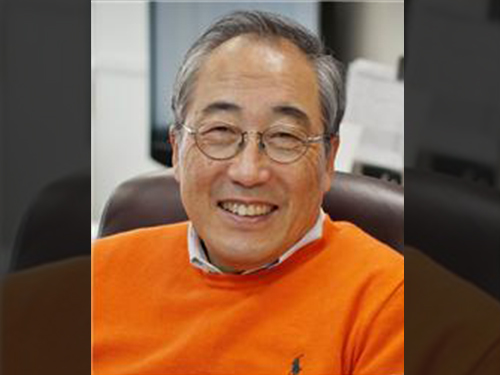 Yang-Hann Kim named recipient of the Rossing Prize in Acoustics Education by the Acoustical Society of America
Courtesy of the Acoustical Society of America (ASA)
Press release issued by ASA on October 8, 2015:
Yang-Hann Kim named recipient of the Rossing Prize in Acoustics Education by the Acoustical Society of America
Melville (NY), 8 October 2015—Yang-Hann Kim, Professor at KAIST (Korea Advanced Institute of Science and Technology), Daejeon, has been named recipient of the Acoustical Society of America (ASA) Rossing Prize in Acoustics Education. The Rossing Prize is awarded to an individual who has made significant contributions toward furthering acoustics education through distinguished teaching, creation of educational materials, textbook writing and other activities. The Prize will be presented at the 170th meeting of the ASA on 4 November 2015 in Jacksonville, Florida.
“It is my great honor to receive the Rossing Prize, which has been given to outstanding scholar members of ASA since 2003. I never dreamed to be one of them.” said Kim. “I must express my deep respect and love to my friend Thomas Rossing: I have known him more than 20 years, always respect what he has done for teaching, writing books, and pioneering work in musical acoustics.”
Yang-Hann Kim is a Fellow of the Acoustical Society of America. He received a Ph.D. from the Massachusetts Institute of Technology. His main research interests in acoustics began with “sound visualization” resulted in the development of the “sound camera” which makes any sound visible instantly. Then he moved to “sound manipulation.” Using his manipulation technology, one can move any sound in space and time, positioning sound, and can create a private sound zone. Sound Visualization and Manipulation, (Wiley, 2013), summarizes these two fields. Dr. Kim’s textbook, Sound Propagation: An Impedance Based Approach (John Wiley and Sons, 2010), is well acknowledged by the associated professional communities as one of best acoustics textbooks. Using his teaching experience at KAIST, he created a YouTube lecture on acoustics and vibration which is also available in MOOC (Massive Open Online Course). He has also presented lectures to over 500 engineers and technicians for the past 30 years.
###
The Acoustical Society of America (ASA) is the premier international scientific society in acoustics devoted to the science and technology of sound. Its 7000 members worldwide represent a broad spectrum of the study of acoustics. ASA publications include the Journal of the Acoustical Society of America—the world’s leading journal on acoustics, Acoustics Today magazine, books, and standards on acoustics. The Society also holds two major scientific meetings per year. For more information about the Society visit our website, www.acousticalsociety.org.
2015.10.06 View 11153
Yang-Hann Kim named recipient of the Rossing Prize in Acoustics Education by the Acoustical Society of America
Courtesy of the Acoustical Society of America (ASA)
Press release issued by ASA on October 8, 2015:
Yang-Hann Kim named recipient of the Rossing Prize in Acoustics Education by the Acoustical Society of America
Melville (NY), 8 October 2015—Yang-Hann Kim, Professor at KAIST (Korea Advanced Institute of Science and Technology), Daejeon, has been named recipient of the Acoustical Society of America (ASA) Rossing Prize in Acoustics Education. The Rossing Prize is awarded to an individual who has made significant contributions toward furthering acoustics education through distinguished teaching, creation of educational materials, textbook writing and other activities. The Prize will be presented at the 170th meeting of the ASA on 4 November 2015 in Jacksonville, Florida.
“It is my great honor to receive the Rossing Prize, which has been given to outstanding scholar members of ASA since 2003. I never dreamed to be one of them.” said Kim. “I must express my deep respect and love to my friend Thomas Rossing: I have known him more than 20 years, always respect what he has done for teaching, writing books, and pioneering work in musical acoustics.”
Yang-Hann Kim is a Fellow of the Acoustical Society of America. He received a Ph.D. from the Massachusetts Institute of Technology. His main research interests in acoustics began with “sound visualization” resulted in the development of the “sound camera” which makes any sound visible instantly. Then he moved to “sound manipulation.” Using his manipulation technology, one can move any sound in space and time, positioning sound, and can create a private sound zone. Sound Visualization and Manipulation, (Wiley, 2013), summarizes these two fields. Dr. Kim’s textbook, Sound Propagation: An Impedance Based Approach (John Wiley and Sons, 2010), is well acknowledged by the associated professional communities as one of best acoustics textbooks. Using his teaching experience at KAIST, he created a YouTube lecture on acoustics and vibration which is also available in MOOC (Massive Open Online Course). He has also presented lectures to over 500 engineers and technicians for the past 30 years.
###
The Acoustical Society of America (ASA) is the premier international scientific society in acoustics devoted to the science and technology of sound. Its 7000 members worldwide represent a broad spectrum of the study of acoustics. ASA publications include the Journal of the Acoustical Society of America—the world’s leading journal on acoustics, Acoustics Today magazine, books, and standards on acoustics. The Society also holds two major scientific meetings per year. For more information about the Society visit our website, www.acousticalsociety.org.
2015.10.06 View 11153 -
 KAIST's Research Team Receives the Best Paper Award from the IEEE Transaction on Power Electronics
A research team led by Professor Chun T. Rim of the Department of Nuclear and Quantum Engineering at the Korea Advanced Institute of Science and Technology (KAIST) has received the First Prize Papers Award from the IEEE (Institute of Electrical and Electronics Engineers) Transactions on Power Electronics (TPEL), a peer-reviewed journal that covers fundamental technologies used in the control and conversion of electric power.
A total of three research papers received this award in 2015.
Each year, TPEL’s editors select three best papers among those published in the journal during the preceding calendar year. In 2014, the TPEL published 579 papers. Professor Rim’s paper was picked out as one of the three papers published last year for the First Prize Papers Award.
Entitled “Generalized Active EMF (electromagnetic field) Cancel Methods for Wireless Electric Vehicles (http://ieeexplore.ieee.org/xpls/abs_all.jsp?arnumber=6684288&tag=1),” the paper proposed, for the first time in the world, three generalized design methods for cancelling the total EMF generated from wireless electric vehicles. This technology, researchers said, can be applied to any wireless power transfer systems.
The award ceremony will be held at the upcoming conference of the 2015 IEEE Energy Conversion Congress and Expo in September in Montreal, Canada.
2015.08.27 View 12324
KAIST's Research Team Receives the Best Paper Award from the IEEE Transaction on Power Electronics
A research team led by Professor Chun T. Rim of the Department of Nuclear and Quantum Engineering at the Korea Advanced Institute of Science and Technology (KAIST) has received the First Prize Papers Award from the IEEE (Institute of Electrical and Electronics Engineers) Transactions on Power Electronics (TPEL), a peer-reviewed journal that covers fundamental technologies used in the control and conversion of electric power.
A total of three research papers received this award in 2015.
Each year, TPEL’s editors select three best papers among those published in the journal during the preceding calendar year. In 2014, the TPEL published 579 papers. Professor Rim’s paper was picked out as one of the three papers published last year for the First Prize Papers Award.
Entitled “Generalized Active EMF (electromagnetic field) Cancel Methods for Wireless Electric Vehicles (http://ieeexplore.ieee.org/xpls/abs_all.jsp?arnumber=6684288&tag=1),” the paper proposed, for the first time in the world, three generalized design methods for cancelling the total EMF generated from wireless electric vehicles. This technology, researchers said, can be applied to any wireless power transfer systems.
The award ceremony will be held at the upcoming conference of the 2015 IEEE Energy Conversion Congress and Expo in September in Montreal, Canada.
2015.08.27 View 12324